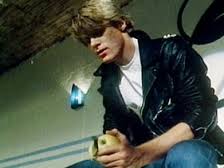I’ve always wanted to be an athlete.
Maybe, more accurately, I wanted to be something other than fat.
Running became a part of my life a little over a decade ago when I was a student in a masters program. And yes, I was fat at the time.
I don’t know how much overlap there is between these two conditions – of wanting to be an athlete and wanting to be something other than fat. To my younger self, people who were athletic in nature appeared to be a lot more fun than the rumpled, chafing self that I was for most of my life. Girls who played sports were usually tall, had thighs that never rubbed together, had boyfriends, and were able to wear their hair in a ponytail and manage to keep all the hair in said ponytail, no matter how much energy they exerted.
I didn’t really know athletic people until I got to high school. Sports were less widely played in elementary school then and the only thing available to us was intramural basketball as well as varsity teams who played other schools. (I played intramural basketball for one season in fifth grade and it was embarrassing. I was on a team called the Suns. We played on Friday nights in the gym of a local public school. The highlight of those games was buying ink pens out of a vending machine there because we never saw something so fantastic before. I scored only one basket all season, during our last game.) In school there was no physical education requirement nor did we have a space for physical activity, unless you counted the asphalt parking lot we had recess in, with its death-trap merry-go-round and the obligatory Our Lady of Fatima grotto, surrounded by two concrete kneelers, way in the back.
Although I had watched some ice-skating and gymnastics during prior Olympics, the first women’s sports drama that mesmerized me was during the 1984 Summer Olympics. The year of Mary Lou Retton and Joan Benoit and the high drama of Mary Decker being carried off the track by her boyfriend after a suspicious fall during a race. I don’t know what this says about my perception of my own feminism (or lack thereof?), but I don’t remember being excited about them being powerful women athletes. I just remember thinking, wow, they’re not fat and they are sure getting a lot of attention.
Maybe that’s part of what also fell into the stew of my own identity of being female and having a serious weight problem as a child. By the time I turned twelve that summer, I already had a whole slew of items bubbling around in that stew: the knowledge that a pediatrician told my mother to put a lock on our refrigerator when I was three, suffering the mortification of being weighed by the school nurse annually in front of my peers, seeing a picture of myself as preschooler in a bikini and counting the tiny fat rolls on my stomach that looked like a pack of hot dogs.
Girls today seem to be so in tune with how great it is to be a girl and sports seem so focused on their gender. I’m not sufficiently informed about feminist issues to comprehend all the factors at play with how all these things affect our self-image as women. At the time, it didn’t matter to me that Mary Lou Retton was a girl; my 12 year-old brain realized that I also had brown hair and maybe if I took the town bus to the mall and used my allowance for a haircut like hers, maybe I would feel like I mattered. I surely could not articulate it at the time, but I probably wanted to feel like I mattered to boys and also to some of the girls who began turning into mean, cliquey girls. And in terms of feeling like I mattered, I don’t necessarily think it was big, bad society’s fault that I felt on the fringe. I think I just felt like a 12 year-old girl. With a weight issue.
After a few moderately successful attempts to lose weight, I managed to lose – and keep off almost all of it for over six years – sixty pounds. Because I never lost the image of Joan Benoit or Mary Decker or all the ladies I watched every year in the Boston Marathon, I kept running. Losing a significant amount of weight changed my life in so many positive ways and I continue to make an effort to keep myself at a weight that feels comfortable for me. In addition to avoiding some foods that used to be a problem for me, I work out frequently.
I’m not sure what the emotional repercussions will be in the future, but recently a doctor told me to stop running due to some pretty ugly arthritis in my knees. So many thoughts have passed through my head since hearing this news, including hopes of striving across longer finish lines than I currently do, knowing I’m not meant to cross them now.
There are many great things about not being twelve anymore. My worth is not wrapped up in whether my ponytail is intact or that I can get a cute haircut if I want. My worth is also not tied up in the identity I’ve created as an athlete. I’m pretty sure I’ll still be crossing finish lines, even if they are only figurative. Or who knows. I may not have the image of Joan Benoit or Mary Decker as my models, but I’ll always have Diana Nyad! Time to advance beyond the doggy paddle.

